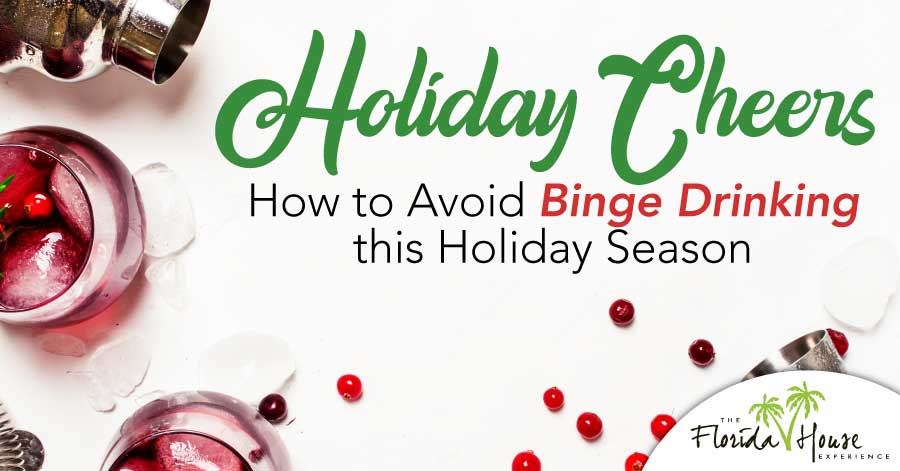
The holidays are a time to be jolly, to let loose and enjoy some well-deserved relaxation with friends, family and loved ones. As a time of year dominated by parties, family gatherings and special moments, there’s plenty of fun to be had during the snowy season. Unfortunately, in many social circles, spreading a little holiday cheer is often associated with a drink or two… or ten.
As one of the heaviest times of year for binge drinking, whether due to too many good times or in response to seasonal or situational depression, it can be hard to say no to alcohol. For those with a substance use disorder, abstinence is always the best approach. But those who do not have a history with alcoholism (or it has not yet been identified) and those who simply want to keep unhealthy habits to a minimum, it can be hard to say no when the eggnog — or the tequila shots — start flowing. Here’s what you can do to avoid binge drinking this holiday season and why staying in control is so important.
What Is Binge Drinking?
Binge drinking refers to patterns of heavy drinking that bring blood alcohol content (BAC) to over 0.08. It’s classified as five drinks over a two-hour period for women and four drinks for men. One in six adults binge drinks four times or more a month, with an average of 467 drinks per binge drinker per year. Binge drinking is highest among young adults, including those under age 21, and is twice as common in men as in women.
Slinging back a half-dozen drinks over the course of a night may seem like fun and games in the moment, but the consequences go far beyond a bad hangover the next day. These include:
- Violence and suicide rates
- Sexually transmitted diseases
- Unintended pregnancy and fetal alcohol symptom
- High blood pressure
- Stroke
- Heart disease
- Liver disease
- Cancer, including throat, esophagus, colon and liver cancer
Heavy drinking comes with a cost, too — approximately $249 billion in 2010, or $2.05 per drink. These costs originate from health care expenses, loss of productivity in the workplace and criminal justice costs. Binge drinking, in particular, leads to around $191 billion in annual expenses.
Binge drinking can also lead to drunk driving, which commonly results in a DUI — or worse. Every day, approximately 29 people die in accidents caused by an alcohol-impaired driver. In 2016, 10,497 people were victims of alcohol-related accidents. Tragically, 17 percent of vehicle deaths for children aged birth to 14 are caused by alcohol. Two in three people will be involved in a crash with a drunk driver.
DUIs are prevalent as well. According to the FBI, 1.4 million Americans received DUIs or their equivalent in 2010. Unfortunately, this is only a fraction of those who actually drive under the influence — in 2013, around 9.9 million adults admitted to driving while intoxicated at least once.
Preventing Binge Drinking
Partying can appear fun on the surface, and the popularity of binge drinking is certainly indisputable, but it’s never suggested, even for those without a history of substance abuse. These steps can help you prevent accidents or relapses during the holiday season, keeping you safe and, if you’re in recovery or otherwise abstaining, sober.
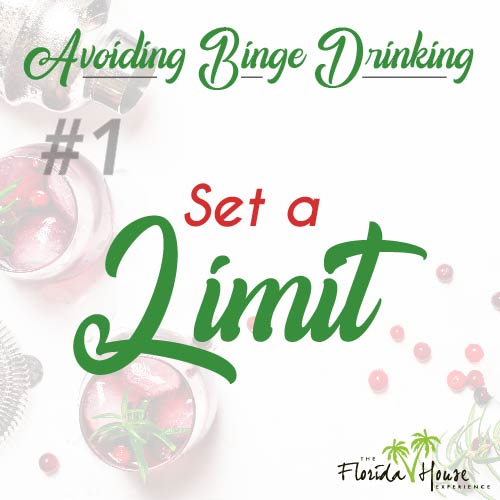 Set a Limit Before You Leave
Set a Limit Before You Leave
If you drink at all, determine how many drinks you will have before you leave for a holiday event. By setting a goal early instead of seeing how the night unfolds, you’ll be able to go into a party with a better mindset and convictions set in stone. To avoid giving into peer pressure, consider planning out what you’ll drink ahead of time. For example, if you know your Aunt Edna will be making her delectable spiced eggnog, don’t settle for a beer or two before the main attraction. Allocate your drinks as specifically as possible so that you don’t find yourself disappointed or making exceptions later on in the night.
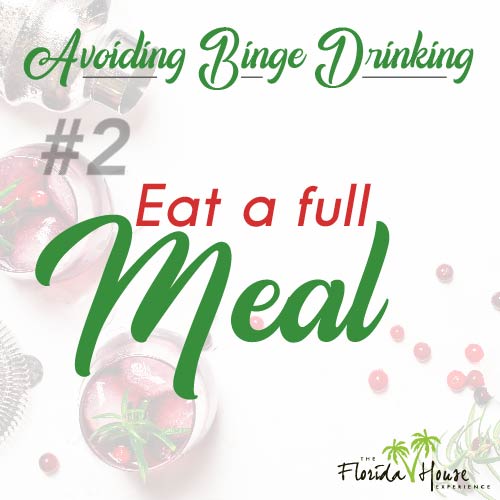 Eat a Full Meal
Eat a Full Meal
Rather than reaching for a cocktail in lieu of dinner, make sure to eat a suitable meal. It can be tempting to skip dinner, particularly if you’re on a diet and trying to save calories, but this is a mistake. Alcohol on an empty stomach can accelerate intoxication. When drinking without an adequate meal first, you may be more likely to get drunk faster. This also increases your likelihood of making poor decisions, like saying yes to additional drinks. Food can also fill you up, potentially decreasing your interest in additional consumption.
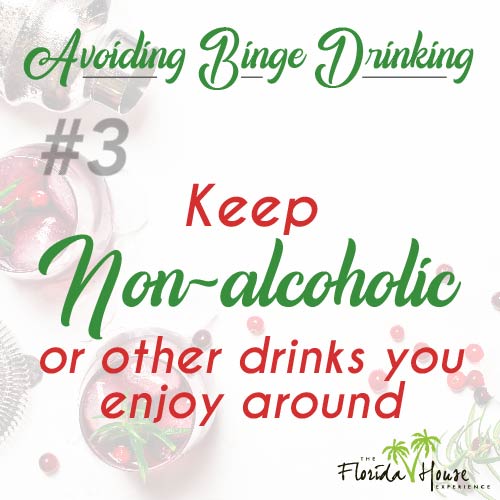 Keep Nonalcoholic Beverages on Hand
Keep Nonalcoholic Beverages on Hand
If you’re in an atmosphere heavy on peer pressure, like out with friends from high school or college, saying no can be a challenge, especially when everyone else is pounding back drinks and having a great time. Instead of sitting around empty-handed, consider choosing a nonalcoholic beverage, like a soft drink or seltzer water, and playing along. You don’t have to lie about your choices, and those who care about you should accept whatever you choose, but sometimes it’s easier to tell a drunk friend that your club soda with lime is a gin and tonic.
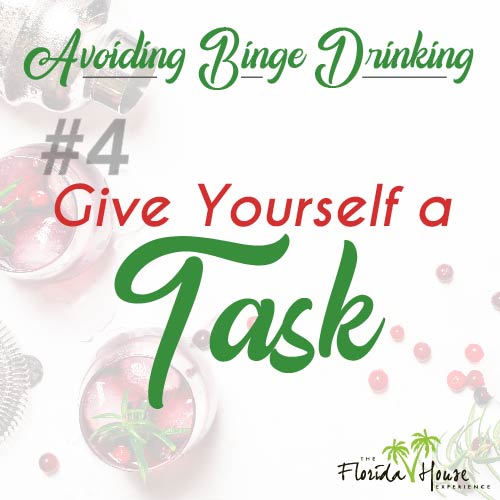 Give Yourself a Party Task
Give Yourself a Party Task
Sometimes, holiday parties can be awkward, particularly if you’re not close with everyone in attendance. This can increase the urge to drink, whether to better tolerate those you dislike or to cut through the awkwardness. Instead of finding yourself sitting around with a drink in your hand, give yourself a task. Help out in the kitchen with meal preparation, take charge of refilling food bowls or take on the dishes after dinner. When you’re busy, you’ll be less interested in drinking.
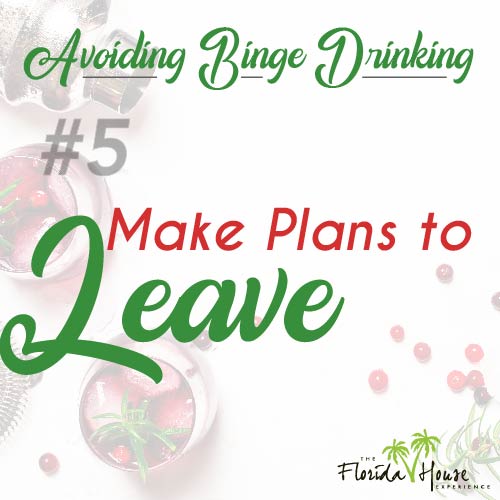 Make Plans to Leave Early
Make Plans to Leave Early
When you have plans that have a tendency to go late into the evening and involve copious amounts of alcohol, it can be a challenge to avoid getting swept up in the fun. Rather than letting late-night drinking drag you down, make plans to leave early. By giving yourself a set time to leave, or by scheduling sober plans after a party that forces an early departure, you can avoid the likelihood of alcohol-fueled mistakes.
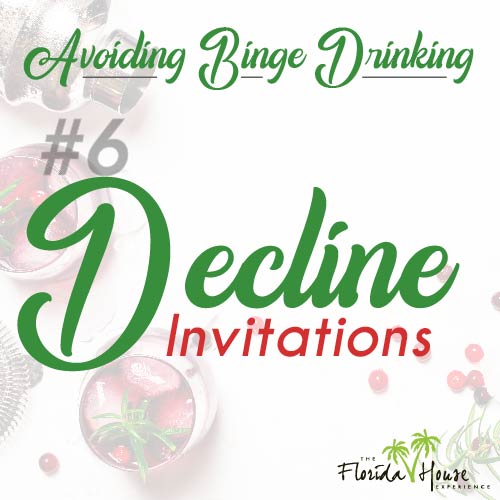 Decline Invitations
Decline Invitations
If the holidays result in a short fuse or alcohol cravings, there’s no rule that says you must play a part. If you aren’t looking forward to an event or you don’t trust yourself to stay sober if you attend, you are fully within your rights to say no. You don’t need a reason, either; simply let the host know that you’re sorry but you are unable to attend.
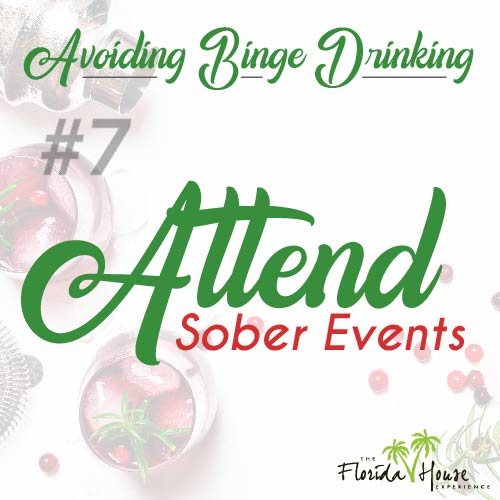 Attend Sober Events
Attend Sober Events
If you are in recovery and are not drinking due to an alcohol use disorder, being around alcohol at all, particularly in the early days, can be next to impossible. Instead of risking a reason to break sobriety, consider organizing events with others you know who are sober, like members of your support or treatment groups. By taking alcohol out of the equation entirely, there’s no temptation present to interfere with your positive progress.
Saying no to alcohol, particularly when you’re a fan, can be an uphill battle, but a little preparation goes a long way. Understanding the dangerous side effects of binge drinking, including the increased likelihood of a DUI or alcohol-related fatality, as well as knowing ways to resist can keep you safe this holiday season.






